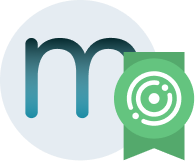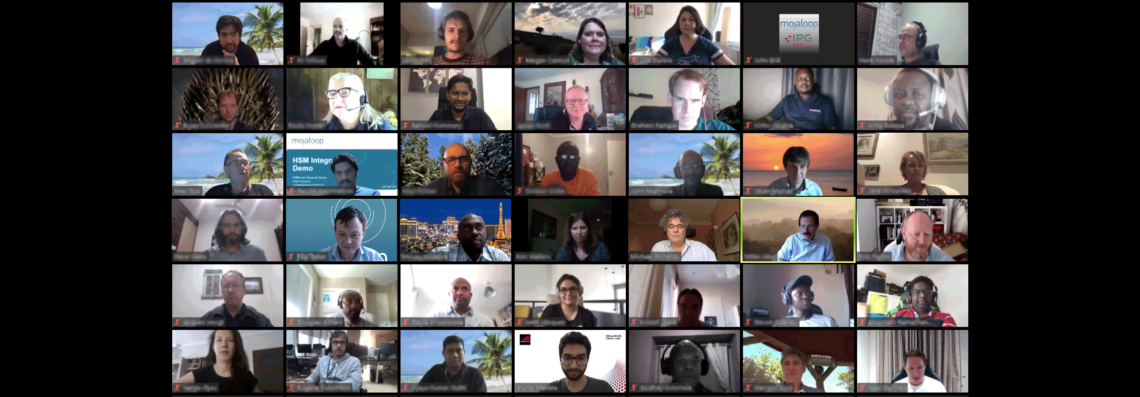 Last week’s Mojaloop Community Event represented exciting milestones for the community and its mission of supporting inclusive financial services. A growing number of friendly faces. Exciting updates and presentations from various teams. A unifying sense of camaraderie and teamwork.
Last week’s Mojaloop Community Event represented exciting milestones for the community and its mission of supporting inclusive financial services. A growing number of friendly faces. Exciting updates and presentations from various teams. A unifying sense of camaraderie and teamwork.
However, there was one very noticeable difference – no one left their home. It was the first virtual gathering for the Mojaloop community and proved to be a bright spot during these trying times.
Throughout the week, it was apparent that the Mojaloop community is thriving. With more than 260 participants logging in from around the globe, the event was by far the largest gathering of our community doubling the number of attendees from the January event. This couldn’t have come at a more needed time with the effects of the COVID-19 pandemic wreaking havoc on the health and financial stability of people everywhere – especially the most vulnerable who live on the edge of destitution.
Mojaloop was built to help overcome the challenges that prevent the financial inclusion of 1.7 billion people who cannot gain access to critical financial services that will improve their lives. Additionally, by accelerating the move to digital payments, we reduce the risk of illnesses spreading today, and in the future. The social distancing impact of COVID-19 and resulting dependence on e-commerce solutions has illuminated the shortcomings of the world’s financial system and expedited the need for interoperable, real-time payments.
In response to the crisis, regulators, mobile money, and card payment companies are all playing their part by changing regulation limits and fees to assist social distancing in countries around the globe. We believe that an interoperable solution like Mojaloop can literally be life-saving by supporting features such as contactless payments and online commerces for the underserved community.
About the event
Mojaloop is in its fourth phase of development dubbed, “Going Live!”. This marked the completion of program increment 9 (PI-9) and the beginning of PI-10. The event highlighted the rapid evolution of Mojaloop and the significant impact that members of the community are making in meeting the objectives.
Delegates presented new developments that have been contributed to the Mojaloop project during PI-9 and workshopped objectives and items to focus on in PI-10. Besides those from the ModusBox team, updates were provided by the Bill and Melinda Gates Foundation, Coil, Crosslake, Deloitte, DFS Labs, Google, GSMA, Mifos, Mowali, Ssnapp, Sybrin, Virtual, and others. You can download and view all of the presentations from the Mojaloop GitHub site.
Here is a sampling of some updates we’re excited to share.
Event Highlights
Google Pay’s update on PISP
In January, it was presented that Google Pay would extend Mojaloop to support Payment Initiation Service Providers (PISP). This brought Google Pay into the Mojaloop ecosystem and will accelerate adoption of digital payments. This month, Google presented an update to the PISP stream and a plan to utilize existing resources in Mojaloop. This was an exciting development for the entire community of implementers because of the great potential it has to accelerate NFC payments to all classes of account holders participating in a Mojaloop real-time payment network.
Mowali’s implementation update
Due to their unique perspective as the first organization to implement Mojaloop, the community is always enthusiastic to hear from the team at Mowali. The team is nearing the go-live for the first production instance of Mojaloop. The project is currently in the final testing phase for the FOREX scenario. During the update, they stressed the importance of prioritizing business, reporting needs as part of implementing a payment system.
Mojaloop Partner Program
The ModusBox team presented the Mojaloop Partner Program and a new Mojaloop Training Lab based on the testing toolkit. This will be part of an overall training experience that includes running templatized scenarios realizing use cases from the Mojaloop FSP Interoperability Specification. One of ModusBox’s efforts to empower the Mojaloop community has been to make the Mojaloop Partner Program freely available. In this training program, you’ll find that there is a course for everyone, even if you’re just trying to understand Mojaloop.
Real-world interoperability and security
Coil and Applied Payments provided a demonstration about the use of hardware security modules (HSMs) and security zones and presented on the challenges to interoperability with legacy payment networks. The update also presented the use of HSMs and why they are necessary for payment systems to safely & securely store keys, PINs, and other sensitive data.
What Happens Next?
The community has officially transitioned into PI-10. This program increment will focus on objectives around supporting bulk transfers, security enhancements, supporting a newer version of the Mojaloop FSPIOP API (v1.1), and additional settlement models.
We’re always on the lookout for new partners and community members. If you’d like to join us on this mission, you can get started from our Mojaloop page. There, you’ll find a number of links to various resources including our Mojaloop Partner Program.
You can also join the Mojaloop community on Slack.






